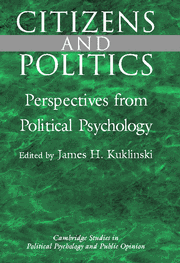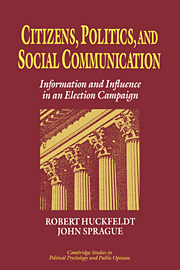Thinking about Political Psychology
Leading scholars in political psychology discuss and debate major issues facing the field of political psychology. They define the boundaries of the field, debate its relevance, consider whether the field is too methodologically individualistic, and whether it can help scholars to understand collective public opinion.
- Will appeal to leading scholars in the field
- Self-critique of major issues facing the fields
- Applies a broad overview of the field
Reviews & endorsements
"...composed of a thoughtful and provocative series of articles and essays...the volume provides stimulating intellectual grist for the mill." Journal of Politics
"the selections are excellent , and Kuklinski's introductory essay walks the reader nimbly through the issues and consequences of political psychology. It is difficult to imagine a better introduction to the field. Highly recommended." Choice
"...there is no comparable resource for encouraging a reflective and critical examination of the foundations and status of the field. Thinking about Political Psychology is an important collection for those who work in the field, and for those entering it is essential reading." Perspectives on Politics
Product details
March 2002Hardback
9780521593779
368 pages
229 × 152 × 24 mm
0.71kg
16 b/w illus. 15 tables
Available
Table of Contents
- Introduction James H. Kuklinski
- Part I. Defining Political Psychology:
- 1. The contours of political psychology: situating research on political information processing John L. Sullivan, Wendy M. Rahn and Thomas Rudolph
- Part II. Theory and Research:
- 2. Who can persuade whom? Implications from the nexus of psychology and rational choice theory Arthur Lupia
- 3. Expanding the envelope: citizenship, contextual methodologies, and comparative political psychology Pamela Johnston Conover and Donald D. Searing
- 4. The challenges of political psychology: lessons to be learned from research on attitude perception Jon A. Krosnick
- Part III. The Psychology-Political Nexus:
- 5. Political psychology and political science John L. Sullivan, Wendy M. Rahn and Thomas Rudolph
- 6. Is political psychology sufficiently psychological? Distinguishing political psychology from psychological political science Jon A. Krosnick
- 7. Political psychology, political behavior, and politics: questions of aggregation, causal distance, and taste Robert C. Luskin
- Part IV. Political Psychology and Aggregate Opinion:
- 8. The micro foundations of mood James A. Stimson
- 9. From denial to extenuation (and finally beyond): political sophistication and citizen performance Robert C. Luskin
- 10. Political psychology and the micro-macro gap in politics.






